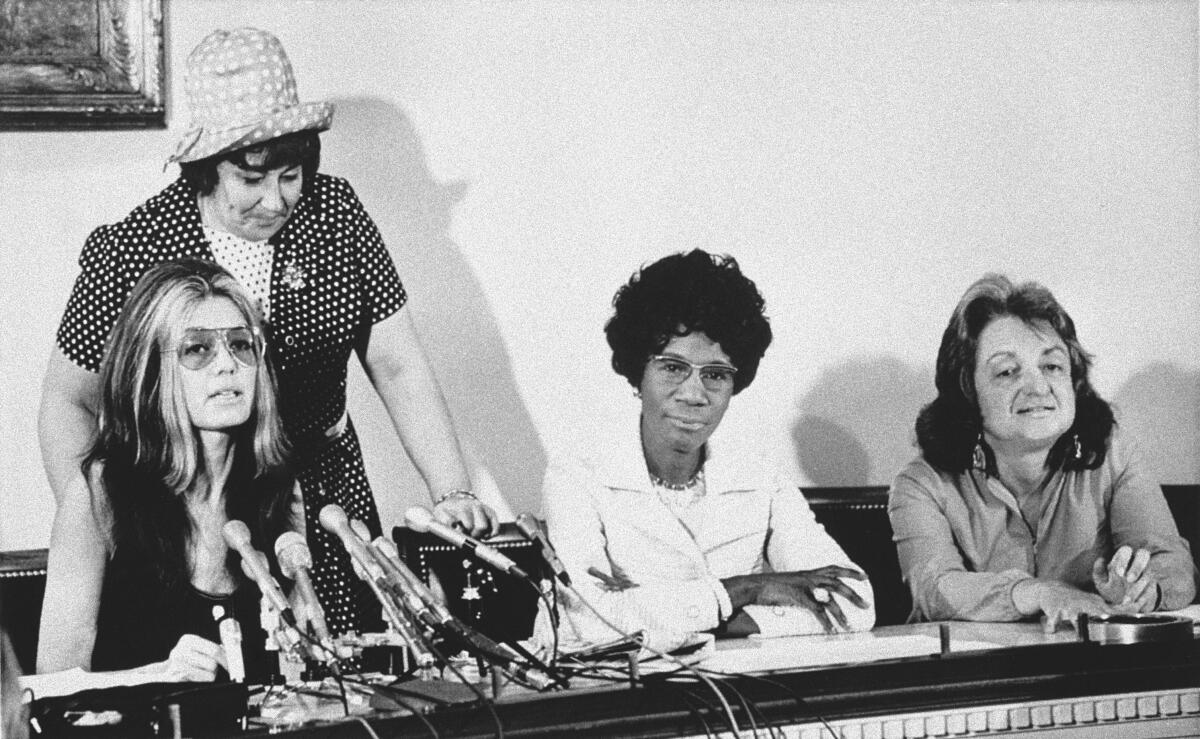Steinem and Smeal: Why ‘Mrs. America’ is bad for American women

What the Emmy-nominated miniseries gets wrong about feminism past and present.
- Share via
Two years ago, I, Gloria, was sent two sample scripts for “Mrs. America,” a television series about the struggle to pass the Equal Rights Amendment. Its coproducers, Stacey Sher and Coco Francini, said the project was already green-lighted by FX, and asked if I was interested in being involved.
I read the scripts and discovered that the whole premise was very wrong. Phyllis Schlafly and her followers were credited with stopping the ERA, rather than the insurance industry and other economic interests that stood to lose billions if the ERA passed. So I wrote back: “I respectfully decline. Yes, it’s good about Schlafly and her interest in military policy, but it comes off as a catfight among women rather than a battle between the ERA and economic interests.” I also sent these coproducers to Ellie Smeal, who, as president of the National Organization for Women during six years of struggle in state legislatures, had learned firsthand that Schlafly was only window dressing. The anti-ERA fix was already in.
For the record:
5:46 p.m. Aug. 13, 2020The caption on an earlier version of this article transposed the names of women’s rights leaders Bella Abzug and Betty Friedan.
5:04 p.m. Aug. 4, 2020This story has been updated to disclose that Gloria Steinem is an unpaid board member of the ERA Coalition.
Two years ago, I, Ellie, became alarmed by the false premise of the sample “Mrs. America” scripts, and asked my colleague, Kathy Spillar, to reach out to the producers about our concerns. Public opinion polls had always proved that a big majority of American women supported the ERA, yet state legislators also knew it was opposed by the insurance industry, chambers of commerce, the National Association of Manufacturers and other corporate lobbyists. Health insurance interests alone stood to lose billions if the ERA forced it to stop charging women more for less coverage, and since that industry was largely state-regulated, it had lobbyists in every state capital. Phyllis Schlafly and her antifeminist homemakers had been brought in to cover for legislators who were voting against the ERA anyway.
Of course, Hollywood can tell any story, regardless of history, but this one is being presented as fact, and has arrived in a perfect storm of circumstance. Months of COVID-19 lockdown have given the nine episodes of “Mrs. America” a captive-at-home audience, and reviews have focused on women’s hairstyles and individual rivalries, not the real reason state legislators voted against the ERA. And while “Mrs. America” depicts pro-ERA forces as slightly more diverse than Schlafly’s lily-white followers, and does introduce viewers to such black feminists as Shirley Chisholm, Florynce Kennedy, Audrey Rowe Colom and Margaret Sloan, it ignores a bigger reality. In the 1972 first-ever national poll about the women’s liberation movement, 67% of black women approved of it, and only 35% of white women did.
Indeed, the plot of “Mrs. America” seems to depend on a trivialization of women of all races. Would a national legislative failure of the civil rights movement be attributed to a rivalry between followers of Martin Luther King Jr. and followers of Malcolm X? Somehow, we don’t think so.
The bottom line is this: “Mrs. America” has described deck chairs on the Titanic but lied about why the Titanic went down. Instead, it has given us the Catfight Theory of History. Of course, women may disagree with each other on all sorts of topics, but the obvious truth is that we don’t have the power to be our own worst enemies. That superlative belongs to the corporate forces that are still making an extra $400 billion a year from paying women of all races less than white men for doing comparable work. And we haven’t even started on unequal parenting, or the real costs of domestic abuse and sexualized violence.

Thanks to the Affordable Care Act and its federal regulation of the insurance industry, the ERA today has a better chance against powerful economic lobbies. And several states have seized the opportunity; Nevada, Illinois and Virginia have all ratified the amendment in recent years. But as Virginia delegate Jennifer Carroll Foy said this year when her vote and the Democratic majority made her state the 38th to ratify the ERA, “Passage of the Equal Rights Amendment today is a result of women coming together over decades, refusing to suffer in silence as we are discriminated against, paid less and subjected to gender-based violence.” Of course, even that crucial 38th ratification doesn’t mean the ERA is now law; the U.S. Congress must vote to remove the timeline for ratification, which was initially set for 1979 and which Congress later extended to 1982, or the federal courts must recognize its ratification.
In “Mrs. America’s” final moments, a series of title cards describes these recent developments; the last ones note that while the House has passed a resolution eradicating the old deadline, the “Republican-controlled Senate is unlikely to take up the measure.” But “Mrs. America” fails to examine why that might be so, and fails to update viewers on the fact that the ERA is again opposed for economic reasons. Republicans want to keep profiteering off inequality. Like pretty much everything else, the fate of the ERA depends on the next election.
We write now because we fear the good actors who play Schlafly and her followers may lead viewers to believe that Schlafly actually changed any votes, or that her anti-ERA campaign was larger or more popular than the campaign for the ERA. Quite the contrary: The pro-ERA majority campaign was larger than anything Schlafly ever produced, with marches and rallies and Lobby Days supported by the endorsements and participation of over 450 major women’s, civil rights and labor organizations representing more than 50 million Americans, including teachers, librarians, nurses, homemakers, garment workers, sports figures, celebrities, artists and workers of all kinds. Thousands of volunteers in unratified states visited state legislators and delivered millions of letters and telegrams to them. The show does acknowledge the broad popular support for the ERA in a later episode, but the time spent with Schlafly and her crew onscreen leaves viewers thinking that she was crucial.
We are not writing because of any personal gripes with “Mrs. America.” I, Gloria, have had to explain to outraged viewers that I, like anyone categorized as a public figure, can bring legal action only if I can prove that my ability to support myself has been damaged. Thus, so what if this show gets my haircut right and my character wrong? And I, Ellie, consider myself super lucky not to be portrayed in this at all. Both of us can live with the result.
But as you watch “Mrs. America,” which was just nominated for 10 Emmys by the Television Academy, we do ask that you think about the false history in this show and its negative impact on the present and future. First, its Catfight Theory not only lies about the past but doesn’t prepare women or men to battle the economic forces that are still opposed to the ERA. Second, viewers don’t learn that in ratified states, coalitions are now working to pass state-level ERAs that are crucial to our lives. Third, “Mrs. America” has exported this Catfight Theory to England, Australia and India, thus misrepresenting history here and depressing even more women. And finally, this series has profiteered off all of the above, without even the courtesy of contributing some of its profits to campaigning for a removal of the deadline, and thus a final ERA victory. Exactly how much are FX and Hulu making? Indeed, how much are the show’s producers, showrunners and stars making?
I don’t think viewers would be unreasonable in expecting that, say, 10% of all profits from “Mrs. America” be contributed to the ERA Coalition (I, Gloria, am an unpaid board member). The group unites more than 100 national and local organizations still struggling to join every other democracy in the world by including in our Constitution the equality of girls and women, boys and men.
It’s worth checking out the ERA Coalition, which offers information about how to join the 96% of women and 90% of men who support the ERA, and how to contribute to its final passage. It will help make up for the misinformation of “Mrs. America.”
Eleanor Smeal is the president of the Feminist Majority Foundation. Gloria Steinem is a writer and feminist activist.
More to Read
The complete guide to home viewing
Get Screen Gab for everything about the TV shows and streaming movies everyone’s talking about.
You may occasionally receive promotional content from the Los Angeles Times.






